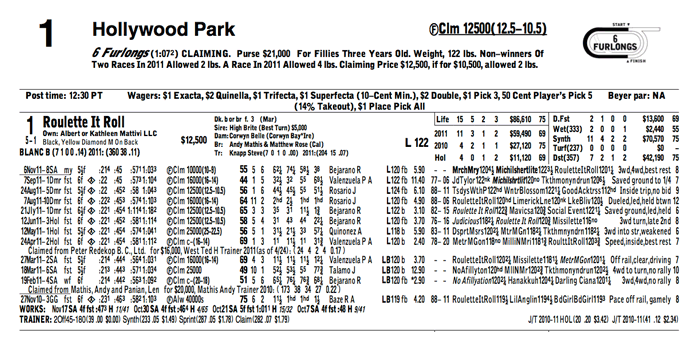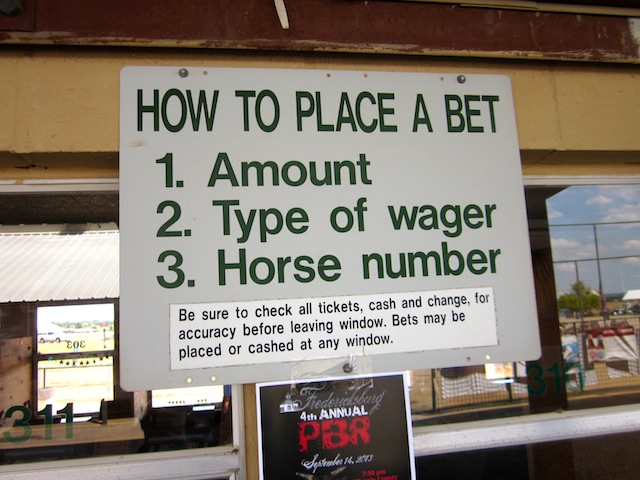
In the last blog, Basics Of Horse Betting, we skimmed the surface on how to make a basic bet at a racetrack. In that blog we reviewed, Win, Place and Show, and how to go up to a betting window and make a bet. Now we will discover exotic wagering! Oh, just the word exotic is exciting!
In this blog we are going to go over a few different types of bets, often called Exotic wagering. Exotic wagering is a bit more in depth than just the Win, Place or Show, and requires some understanding before you put money on them! However, exotic wagering can be very exciting, as with more risk can come more reward! Also we will go over a few basic terms that every bettor should know!
Exotic Wagering
Exacta – You win if you select the 1st and 2nd place horses in a race in the “exact” order.
Trifecta – You win if you select the 1st, 2nd and 3rd place horses in a race in the correct order of finish.
Superfecta – You win if you select the 1st, 2nd, 3rd, and 4th place horses in a race in the correct order of finish.
**PLEASE NOTE: The above exotic wagering, you HAVE to get the EXACT order! If you pick horses in the order of 3,6,5 and the actual results are 3,5,6 you will lose! Make sure you pay attention to those details!**
Box: With the above warning being said, you can do a Exacta, Trifecta or Superfecta BOX. Boxing the horses covers all combinations of finish in one bet. Please note, these can get expensive, but allow more room for error.
Daily Double – Daily Doubles require that you pick the winner of two consecutive races before the running of the first race in the sequence of races. Daily Doubles are usually offered on the first and last two races of each racing card.
Pick 3 – You win if you select the winner of three consecutive races. The bet must be placed prior to the running of the first race in the sequence.
Pick 4 – You win if you select the winner of four consecutive races. The bets must be placed prior to the running of the first race of the Pick 4 sequence.
Horse Racing Terminology
Allowance – A non-claiming race with special entry conditions. Conditions can be very in depth, or simples. The conditions make it so the race should have horses of similar experience racing with each other.
Claiming – A race in which the horses are for sale at a predetermined price. Horses are claimed prior to the running of the race, but the new owner does not assume control of the horse until after the race has been run.
Derby – A stakes for three-year old horses.
Distaff – A race for female horses.
Furlong: A measurement of distance equivalent to 1/8 of a mile. Sprint races are designated in furlongs.
Handicap – A race, usually a stakes race, where horses are assigned weights to be carried based on the conditions of the race. The weight assignments are supposed to “handicap” the better horses so the lesser horse has the same advantage.
Maiden – A race for non-winners.
Oaks – A stakes race for three-year old fillies.
Route – A race at a distance of one mile or longer.
Sprint – A race at a distance less than one mile.
Stakes – A high-level race contested by horses of high quality.
Track Conditions
Taking into account the track conditions of a race can be very important when picking a winner! There was a Seinfeld quote I believe Kramer said, something to the effect of “His muddah was a muddah!” Meaning the horses dam (mother) liked running in the mud. Some horses love slopping around in mud, while others prefer a more cleaner track!
Fast – A dirt track that is dry, even, resilient and fast.
Wet Fast – A track with a firm base, but a wet surface, due to recent rain.
Good – A track condition between fast and slow. There is generally a significant amount of water in a good track.
Muddy – A racetrack that is wet to the base, but does not have standing water.
Off Track – Any track that is not fast.
Sloppy – A track that is wet on the surface, with standing water, but that has a firm base.
Slow – A slow track is wet on both the surface and base.




Leave a Reply